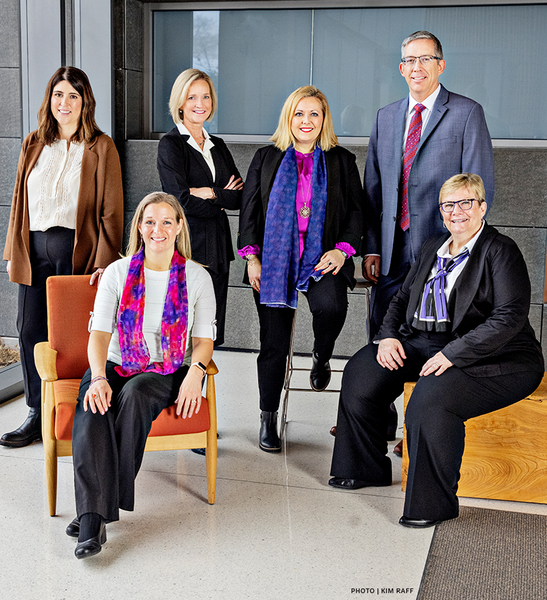TD Magazine Article
Moving From Educators to Enablers
Today's employees must be free to design their careers—and enjoy doing so.
Thu Jun 15 2023

Intermountain Health: 2023 BEST Award Winner, #11

Today's employees must be free to design their careers—and enjoy doing so.
Sometimes the most innovative approaches to talent development fall into your lap. That's what happened during the pre-vaccine days of the pandemic at Intermountain Health, the nonprofit health system based in Salt Lake City, Utah, with 33 hospitals and 385 clinics. Two New York City hospital systems issued pleas for help due to exhausted clinicians who struggled to cope with their patient loads. Intermountain sent 100 physicians and nurses in brief stints to relieve them.
Then came the unexpected. When the TD team interviewed participants about their experiences, they were overwhelmed by the positive response. "Our clinicians returned with incredible insights, increased confidence, and renewed excitement for their work," says Marguerite Samms, vice president and chief learning officer.
Hearing opportunity knocking, Samms proposed an executive development program to apply the partnership concept, enabling executives to learn from exposure to another health system's leader. She believed that doing so could build participants' confidence and trust, improve decision making, and encourage appropriate risk-taking.
Intermountain Health has formalized that into the CrossRoads Leadership Experience, a one-year, interorganizational site-visit program with other healthcare organizations to transform and mature executives. The structure develops three levels of leadership simultaneously—a C-suite mentor, the executive participant, and their delegate leader.
"It is not enough anymore just to help leaders amass skills," Samms explains. "They need to mature in their leadership roles, something we can't teach in a classroom." Early program outcomes include improved decision quality, increased confidence, courage to act faster and take appropriate risks, as well as higher trust in participants by direct managers and direct reports.
Meeting critical needs
The initiative underscores something else too—patients aren't the only individuals Intermountain Health nurtures. Equally important are the needs and aspirations of its 60,000 employees, who are known internally as "caregivers."
Consideration of those caregivers is the raison d'être for Samms' 65-person department, the HR-based Learning Center of Excellence. The team pursues an expanding array of initiatives to develop employees and attract new ones, even as it assists with the company's recovery from pandemic-related burdens.
For instance, the pandemic resulted in financial scenarios that far exceeded those of an organization growing at 20–30 percent a year. The number of open positions at Intermountain Health during 2021 and 2022 averaged a daunting 300 percent over typical rates, even as the company closed many facilities. Yet, leadership vowed to keep employees working as it grappled with challenges ranging from employee practices and patient care to supply chain issues.
The TD team immediately formed an innovative redeployment center to retrain more than 12,000 employees per day. The center's staff included learning leaders with clinical backgrounds who used robotic process automation to facilitate training.
Preparing staff for the future
In partnership with business leaders, the TD unit also unveiled a strategy to improve how it would engage, retain, and prepare employees for future demands. It removed all "artificial barriers" to each employee's right to access education. Out went degree requirements from as many positions as possible to better align open jobs with job seekers.
"We view learning as vital to our organization's health, our caregivers' health and well-being, and the community's vitality," states Samms. Yet the healthcare environment has become more challenging since the pandemic. "More of our attention to innovation has gone into our outside-in and inside-up career pathways and supporting our caregivers in driving their own careers," she explains.
The resulting strategy involves a sharp pivot for the TD function both short and long term. A unit created to deliver learning now views its assignment as being an enabler of learning. Samms says that requires an altered agenda to "create the conditions in which caregivers can select their own ventures and design their own careers—and enjoy doing so." She adds that "Today's learning is about providing multiple options and guidance for learners to be self-driven. It's not reasonable to teach everything employees need. It's our role to enable learning—so employees can enjoy long, fulfilling careers with us."
An array of other new TD initiatives underscores that goal. Three examples:
Pathway to Excellence and Knowledge (PEAK). This program compensates employees for tuition expense before they incur those expenses, not after. That includes high school diploma completion, all classes and certifications, as well as undergraduate and graduate degrees. It is available on day one for every employee who works more than 20 hours per week.
The initiative's backbone is an internal platform in which employees can select specific classes with participating institutions that are consistent with their learning goals. In addition to PEAK, the TD team has added 6,000 on-demand courses and certifications, hundreds of paid-up-front certifications and degrees, five apprenticeship programs, learning pathways for five new jobs of the future, a learning pathways team, a career hub, and a gig economy pilot.
One year later, retention of PEAK participants is 8.4 percent higher than all employees, while student conversion to employment is up 16 percent, Samms reports.
OneTen Initiative. Intermountain Health is a founding member of the OneTen Coalition of US businesses that pledge to upskill and hire 1 million Black Americans into family-sustaining jobs over the next decade. With help from a $750,000 grant, the organization hired and trained 50 apprentices, all of whom remain employed one year later. Intermountain Health intends to expand its initiative to help raise other underprivileged groups, starting with immigrants.
Digital Innovation Academy. The TD team's Workforce of the Future strategy led it to establish a Digital Innovation Academy in 2019 to identify and implement jobs of the future and help employees become more digitally fluent. It has identified nine jobs along with corresponding education, including certificate programs in healthcare intelligence analyst, robotics process automation, and apprenticeship programs. It is one of six business-linked academies within the organization.
View the entire list of 2023 BEST Award winners.
You've Reached ATD Member-only Content
Become an ATD member to continue
Already a member?Sign In

